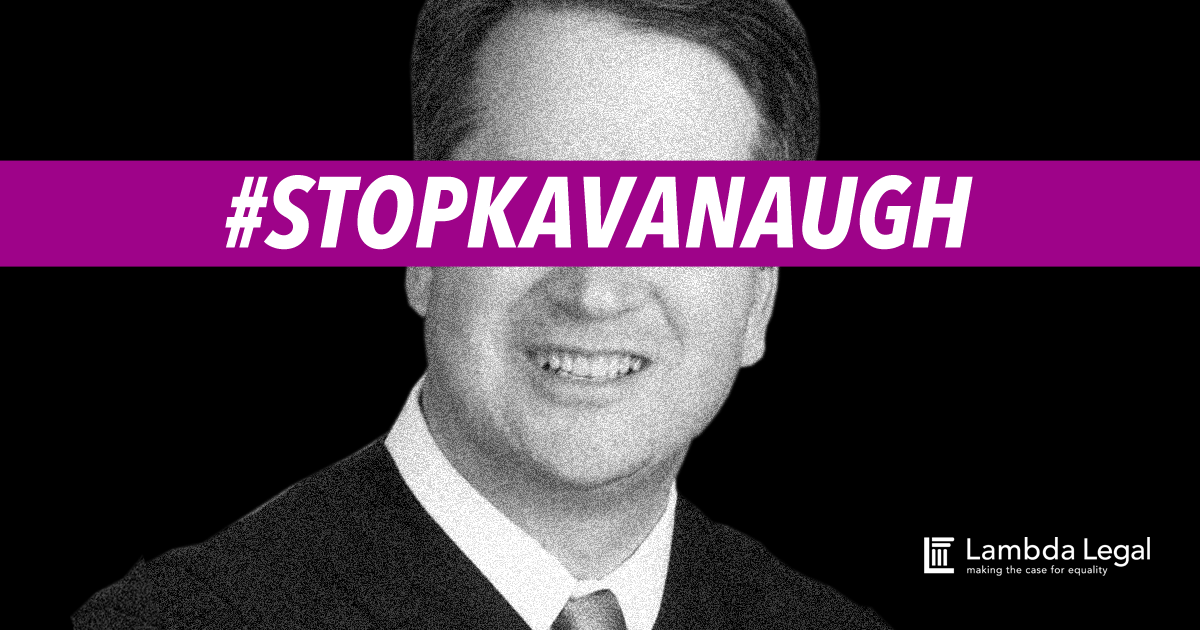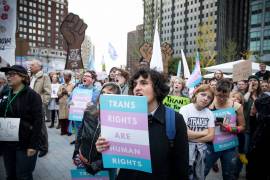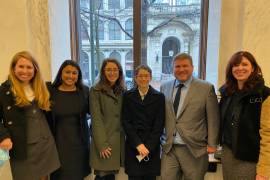After Donald Trump announced that he was considering nominating Brett Kavanaugh, Judge from the D.C. Circuit, to the U.S. Supreme Court, Lambda Legal's Fair Courts Project embarked on a comprehensive review of his judicial record.
We considered the hundreds of opinions authored or co-authored by Judge Kavanaugh in the D.C. Circuit and analyzed other decisions in which he participated involving LGBTQ-identified and LGBTQ-affiliated parties, employment discrimination, reproductive rights, voting rights, criminal justice, rights of detainees, fair courts, or constitutional rights of equal protection, liberty, free speech, or religious exercise.
Below are instances where Judge Kavanaugh's views on civil rights issues are antithetical to Lambda Legal's mission and are the basis for opposing his nomination.
We note that the Family Research Council (FRC) repeatedly advocated on behalf of Mr. Kavanaugh's nomination. FRC sent an email alert in 2005 urging supporters of the religious right to contact Congress and demand Kavanaugh be confirmed. FRC also criticized then-Senator Bill Frist (R-T.N.) for not advancing Kavanaugh's nomination. After Judge Kavanaugh was finally confirmed, FRC praised the vote and urged action on other nominees.
It is clear that they believed that Mr. Kavanaugh would represent their interests, are focused largely on working to undermine the rights of LGBTQ people.
- Presidential Power: Judge Kavanaugh has argued that sitting Presidents should not be subject to civil or criminal charges while in office and that presidents should be able to dismiss any counsel "out to get him" and that the president does not need to follow the law if he thinks the law is unconstitutional.
In Judge Kavanaugh's words:
"Congress should give back to the President the full power to act when he believes that a particular independent counsel is 'out to get him.' Such a step not only would make the special counsel accountable, but it also would force the President and his surrogates to put up or shut up." (source)
"To be sure, the President has the duty to take care that the laws be faithfully executed. That certainly means that the Executive has to follow and comply with laws regulating the executive branch - at least unless the President deems the law unconstitutional in which event the President can decline to follow the statute until a final court order says otherwise." (source)
"In particular, Congress might consider a law exempting a President-while in office-from criminal prosecution and investigation, including from questioning by criminal prosecutors or defense counsel." (source)
It's important to note that questions about the limits of executive privilege and the proper amount of deference owed to the Chief Executive are issues related to matters far beyond the Special Counsel's purview - these questions are at the heart of every challenge to arbitrary presidential action ranging from the separation of children from their families at the border to the declaration of a ban on military service by transgender people.
- Abortion: Judge Kavanaugh was part of a three judge panel that vacated a Temporary Restraining Order issued by a D.C. federal district court allowing an immigrant teenage girl to get an abortion. This order delayed the abortion by requiring the girl to be placed in a sponsor's custody. When the D.C. Circuit then reversed that decision on appeal, Judge Kavanaugh dissented, claiming that the government was creating a "new right" for immigrants in custody "to obtain immediate abortion on demand" for "unlawful immigrant minors." In Judge Kavanaugh's words:
"Today's majority decision…is ultimately based on a constitutional principle as novel as it is wrong: a new right for unlawful immigrant minors in U.S. Government detention to obtain immediate abortion on demand, thereby barring any Government efforts to expeditiously transfer the minors to their immigration sponsors before they make that momentous life decision."
- License to Discriminate: Judge Kavanaugh dissented from the denial of a petition for en banc review following a decision from a three judge panel holding that the ACA's requirement that employer insurance plans cover contraception did not violate the Religious Freedom Restoration Act (RFRA) by permitting religious non-profits to "opt out" (filling out a form) of the contraceptive requirement.
- Health Care: Judge Kavanaugh wrote a lengthy dissent objecting to the denial of a petition to review a lower court holding rejecting a procedural challenge to the ACA (claiming that the legislation had originated in the "wrong" house of Congress). Supporters of this case had hoped that it would provide a vehicle for the Supreme Court to strike down the highly popular and life-saving health care legislation. In another challenge to the law, Judge Kavanaugh wrote a dissenting opinion that set forth a roadmap for Congress to repeal the ACA's individual mandate, which would essentially nullify the law's requirement of coverage for those with preexisting conditions.
- Worker Protections: Judge Kavanaugh has a long history of opposing worker protections. He has consistently ruled against claims of worker discrimination and safety and has written many dissents in cases concerning discrimination claims by workers.
- Consumer Protections: Judge Kavanaugh dissented from a ruling by the majority of the D.C. Circuit rejecting a challenge to have the Consumer Financial Protection Bureau ("CFPB") held unconstitutional. The decision reversed Judge Kavanaugh's panel decision holding that the CFPB was unconstitutional.
Judge Kavanaugh's record clearly demonstrates his hostility toward civil rights.





